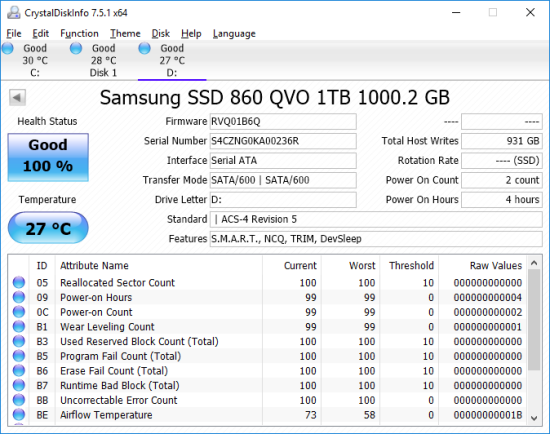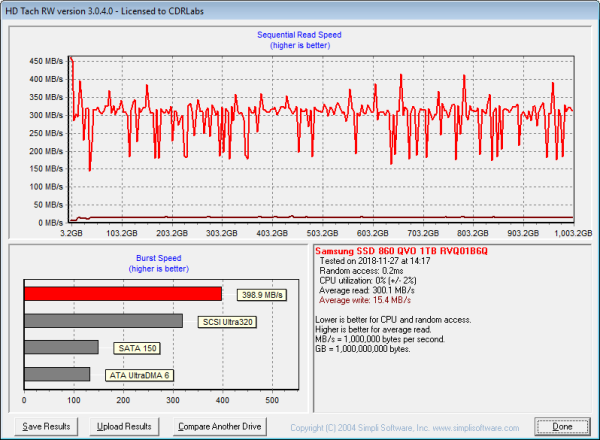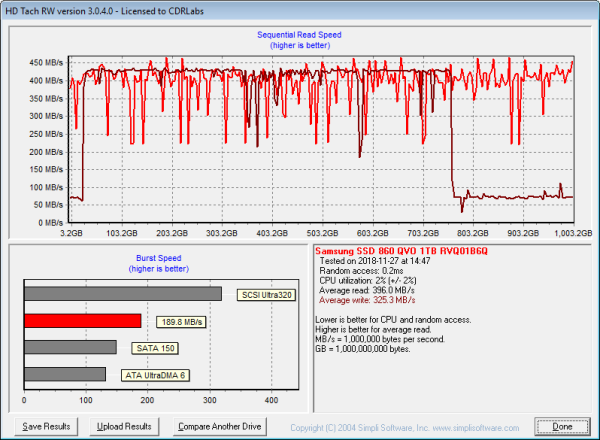TRIM Performance:
While SSDs offer many benefits, there are some downsides to using flash memory. One of the biggest issues people run into is performance degradation. Over time, an SSD will run out of fresh blocks and will have to write over data the file system has marked as deleted. This procedure is very complicated and can slow an SSD's write speeds considerably.
To fix this problem, most manufacturers have added TRIM support to their SSDs. The TRIM command allows an operating system, such as Windows 7, to tell an SSD which data blocks are no longer in use. Using this information, the drive pro-actively erases these blocks and adds them to the free block pool.

To test the 860 QVO's TRIM function, I first put the drive in a "dirty" state. I used Iometer to fill the entire drive and then ran a random write test for 30 minutes. Looking at the screenshot below, you can see that the 860 QVO's average read and write speeds dropped to 300.1 MB/s and 15.4 MB/s, respectively.

Samsung 860 QVO - Dirty
To see how well the 860 QVO could recover, I let the computer sit for about 30 minutes and then reran the test. The drive wasn't able to reach the factory fresh performance shown in our earlier tests. However, its average write speed jumped up to 325.3 MB/s.

Samsung 860 QVO - After Trim
Lastly, I used Parted Magic to perform a secure erase on the 860 QVO. With the drive wiped clean, it had average read and write speeds of 469.3 MB/s and 498.2 MB/s, respectively.

Samsung 860 QVO - Secure Erase
Final Thoughts:
High capacity SSDs are nothing new for Samsung. The company was one of the first to introduce a 1TB model and has continued to push the envelope ever since. Unfortunately, even with the 860 EVO and its 3-bit MLC V-NAND, the price of these high capacity drives has put them out of reach for most consumers. As a result, many people use a low-capacity SSD for booting and a high-capacity hard drive for data storage. Samsung is looking to change this with the 860 QVO. Built on the company's new 4-bit MLC V-NAND, the 860 QVO delivers both high capacity and performance in a single, affordable drive.
While 4-bit MLC (QLC) does let you store more data in the same physical space, this sometimes causes diminished performance. To offset this, Samsung has equipped the 860 QVO with its Intelligent TurboWrite technology. In everyday PC usage environments, the drive's performance is much like that of the 860 EVO. In our tests, the 1TB version of the 860 QVO was able to read at speeds as high as 560 MB/s and write at speeds in excess of 511 MB/s. It also had no problems holding its own in our random write tests, but, for whatever reason, lagged behind many of the other drives when doing random reads.
Of course, high capacity and performance aren't the only things the 860 QVO has to offer. Along with support for technologies like RAPID and Intelligent TurboWrite, the drive features AES 256-bit full disk encryption and is compatible with both the TCG Opal 2.0 and IEEE 1667 specifications. The drive also supports the SATA Device Sleep (DEVSLP) standard which extends the battery life of a device by reducing the drive's power consumption when it's not in use. Last, but not least, the 860 QVO is covered by a 3 year warranty with an endurance rating of up to 1,440 terabytes written (TBW) for the 4TB model.
The 860 QVO will be available on December 16, 2018, with a manufacturer’s suggested retail price (MSRP) starting at $149.99 for the 1TB model.

Highs:
- Equipped with 4-bit MLC V-NAND technology
- Available in 1TB, 2TB and 4TB capacities
- Good sequential read and write speeds under most conditions
- Good random write performance
- Features Intelligent TurboWrite technology
- Large DRAM cache
- Supports TRIM and garbage collection
- AES 256-bit full disk encryption
- TCG Opal 2.0 and IEEE 1667 compliant
- DEVSLP power mode
- Includes SSD Magician software and Data Migration Tool
- Reasonably priced
- 5 year warranty
Lows:
- Write speed drops considerably when SLC cache is full
- Lackluster random read performance
- Lower endurance than other 860 series SSDs

